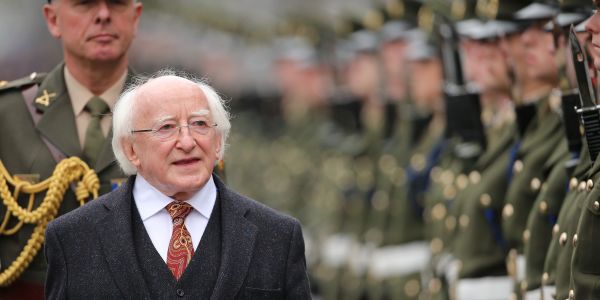Ireland’s 1916 commemorations must make room to remember all those who suffered or were affected by the Rising, President Michael D Higgins has said.
At a special State ceremony at the Royal Hospital Kilmainham to honour revolutionary women over the last 100 years, Mr Higgins urged the country to recall the part they played in laying the foundations of modern Ireland.
The President called on society to reflect on the work that remains to be done if the Republic is to live up to their dreams of equality and justice.
He also used the ceremony to call for people to acknowledge the wider historical context of the Rising with tens of thousands of Irish men off fighting in the First World War, abject poverty in the tenements of Dublin and the discrimination against women then and into the early decades of the Free State and the Republic.
“The actions of those women, who were our mothers and grandmothers, our aunts and grandaunts, our neighbours and our teachers, are an inextinguishable source of inspiration as we continue the work of building, together, a more just, a more caring and a more equal Ireland,” he said.
“There is no single narrative of 1916, no monopoly over the interpretation of our history.”
The event was attended by descendants of those involved in the Rising, TDs and Senators , lawyers, the arts, sports and community sectors and activists.
It also coincided with International Women’s Day.
Along with music and drama performances a specially commissioned Living For Ireland quilt was also on display with each panel designed by a women’s activist to commemorate the 77 women held in Richmond Barracks in 1916.
Mr Higgins said our accounts of the Rising must always be grounded on an awareness of this wider context.
“They must include not just the leaders and their wives, but make space for all those who suffered, so many who were too poor, too marginalised and too disenfranchised to be heard,” he said.
The President said the 485 men, women and children who died in Dublin during Easter week should be remembered along with the families of the 580 soldiers killed on the Western Front in the same week.
Mr Higgins said they died “in a clash between the world’s most powerful and insatiable empires”.
He also said the marginalisation of women in the first five decades of an independent Ireland appears more starkly.
“Those restrictions placed on the participation of women in the public life of the state were all the more disappointing as the rights of women was a cause that a significant number of the women of 1916 had espoused with passion,” Mr Higgins said.
He also warned of the limitations placed on women in modern Ireland.
“There too often remains a glass ceiling blocking women’s access to decision-making positions,” he said.
“Taking stock of what we have achieved, we must relentlessly seek to complete our collective journey towards the full enjoyment of women’s rights, in Ireland and beyond.
“Indeed the rights of women run to the heart of the political, socio-economic and cultural challenges of our contemporary world, none of which can be understood without recognising the gendered nature of inequality and injustice.”
